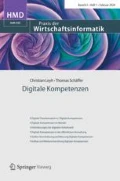Zusammenfassung
Wissensmanagement ist eine komplexe Aufgabe, welche oftmals von existierenden Wissensmanagementsystemen nur unzureichend unterstützt wird. Insbesondere in Projekten, in welchen Projektmitarbeiter meist einen heterogenen Hintergrund haben und nur für eine begrenzte Zeit zusammenarbeiten, ist das Wissensmanagement eine große Herausforderung. Projektwissen wird nur selten dokumentiert und noch seltener wiederverwendet, da die Projektmitglieder keine Zeit und wenig Motivation für dessen Dokumentation haben. Als Konsequenz daraus werden oftmals bereits bekannte Lösungen gefunden und Projektteams machen die gleichen Fehler wie ihre Vorgänger. Gamification stellt eine Lösung für dieses Problem dar, da es darauf abzielt, die aktive Teilnahme in Anwendungssystemen zu motivieren. Der vorliegende Beitrag beschreibt die Gestaltung und Umsetzung eines gamifizierten Projektwissensmanagementsystems, genannt ProjectWorld, in einem Unternehmen. Die ProjectWorld zielt darauf ab, Mitarbeiter zu motivieren, sich dauerhaft am Wissensmanagement zu beteiligen und ihr Wissen mit anderen Mitarbeitern zu teilen. Obwohl noch keine konkreten, empirisch fundierten Ergebnisse bezüglich langfristiger Effekte auf die Wissensdokumentation und –wiederverwendung vorliegen, kann man, basierend auf qualitative Aussagen der potentiellen Nutzer, positive Auswirkungen auf das Projektwissensmanagement im Unternehmen annehmen.
Abstract
Knowledge management is a complex endeavor which is often insufficiently supported by existing knowledge management systems. In particular, projects suffer from challenges of project knowledge management, since its team members are highly heterogeneous with regard to their background and work together for only a limited duration. Thus, project knowledge is rarely documented and even more rarely reused due to a lack of time and low motivation of team members. As a consequence, project teams are finding already known solutions or make the same mistakes like previous projects. Gamification is a new trend which promises to solve these issues, since it aims to motivate system users to engage in application systems. This article describes the design and realization of a gamified project knowledge management system named ProjectWorld in a company. ProjectWorld aims to motivate employees to engage in knowledge management and to share their knowledge within the organization. Although, at an early stage with no empirical results regarding the effects of the gamified system on knowledge documentation and reuse, it can be assumed—based on qualitative statements of potential users—that ProjectWorld will have positive impacts on the project knowledge management of the company.



Literatur
Firestone JM, McElroy MW (2003) Key issues in the new knowledge management. KMCI Press, Butterworth-Heinemann, Boston
Hasan H, Pfaff CC (2006) The Wiki. In: Proceedings of the 20th Conference of the Computer-Human Interaction Special Interest Group (CHISIG) of Australia on Computer-Human Interaction: Design, Activities, Artefacts and Environments - OZCHI ’06, S. 377–380
Hsu JS-C, Shih S-P, Chiang JC, Liu JYC (2012) The impact of transactive memory systems on IS development teams’ coordination, communication, and performance. Int J Proj Manag 30(3):329–340
Laschke M, Hassenzahl M (2011) Mayor or Patron? The Difference Between a Badge and a Meaningful Story. In: Proceedings of the CHI 2011 Workshop on Gamification, S. 72–75
Lee JJ, Hammer J (2011) Gamification in education: what, how, why bother? Acad Exch Quarterly 15(2):1–5
Li Z, Huang K, Cavusoglu H (2012) Quantifying the Impact of Badges on User Engagement in Online Q & A Communities. In: Conference Proceedings of the 2012 International Conference on Information Systems (ICIS 2012)
Paharia R (2012) Gamification means amplifying intrinsic value. Interactions 19(4):17
Palmisano J (2009) Motivating Knowledge Contribution in Virtual Communities of Practice: Roots, Progress and Needs. In: Proceedings of the 2009 Americas Conference on Information Systems (AMCIS 2009), Artikel 198
Petter S, Randolph AB (2009) Developing soft skills to manage user expectations in IT projects: knowledge reuse among IT project managers. Proj Manag J 40(4):45–59
Schacht S, Morana S, Maedche A (2014). The ProjectWorld – Gamification in Project Knowledge Management. In: Conference Proceedings of the 2014 European Conference on Information Systems (ECIS 2014)
Schacht S, Morana S, Maedche A (2015). The evolution of design principles enabling knowledge reuse for projects – an action design research project. J Technol Theory Appl (JITTA) 16(2) Artikel 1 (im Erscheinen)
Sein MK, Henfridsson O, Purao S, Rossi M, Lindgren R (2011) Action design research. MIS Quarterly 35(1):37–56
Sjöklint M, Constantiou I, Trier M (2013) Numerical Representations and User Behaviour in Social Networking Sites: Towards A Multi- Theoretical Research Framework. In: Proceedings of the 2013 European Conference on Information Systems (ECIS 2013), Artikel 167
Thom J, Millen D, DiMicco J (2012) Removing Gamification from an Enterprise SNS. In: Proceedings of the ACM 2012 Conference on Computer Supported Cooperative Work - CSCW ’12, ACM Press, S. 1067–1070
Author information
Authors and Affiliations
Corresponding author
Rights and permissions
About this article
Cite this article
Schacht, S., Reindl, A., Morana, S. et al. Projekterfahrungen spielend einfach mit der ProjectWorld! – Ein gamifiziertes Projektwissensmanagementsystem. HMD 52, 878–890 (2015). https://doi.org/10.1365/s40702-015-0176-7
Received:
Accepted:
Published:
Issue Date:
DOI: https://doi.org/10.1365/s40702-015-0176-7

